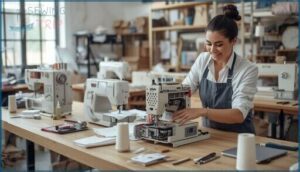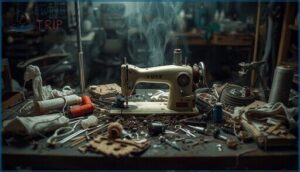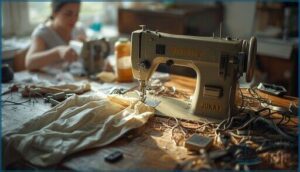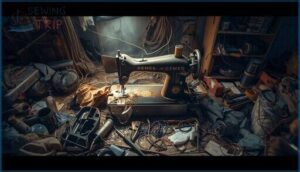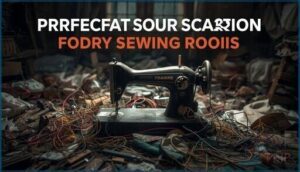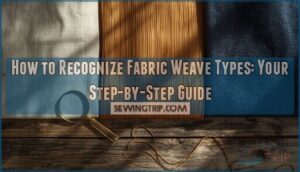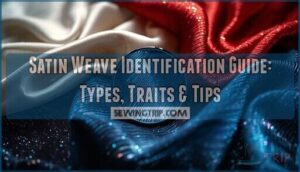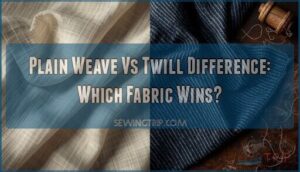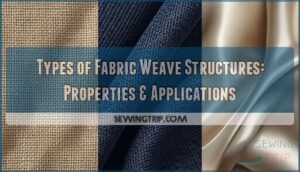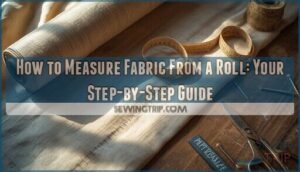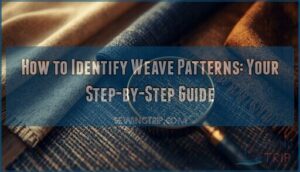This site is supported by our readers. We may earn a commission, at no cost to you, if you purchase through links.
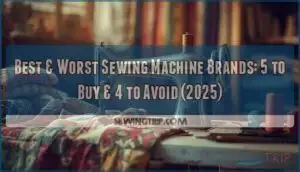
Singer and JUKI build machines I rarely see in my repair shop, while brands like Vof and Jukky keep my schedule packed with frustrated sewers holding machines that failed after weeks. Your choice of brand affects everything from stitch quality to whether you can find replacement parts when something breaks.
Some manufacturers back their machines with responsive support teams and solid warranties, while others vanish the moment you need help.
Table Of Contents
Key Takeaways
- Singer and JUKI machines rarely need repairs because they’re built with metal frames and gears that last decades, while cheap brands like Vof, Jukky, Oemer, and Toahine use plastic parts that crack within months and offer zero customer support when things break.
- Brother leads in reliability with 25-year warranties and responsive service, Janome delivers superior stitch quality with 15-25 year coverage, and Bernina provides 20-year warranties on premium machines—warranty length directly reflects how long manufacturers expect their machines to actually work.
- Mechanical machines with metal construction outlast computerized models because they have fewer electronic components to fail, though computerized options like the Bernette B79 justify their higher price if you need embroidery capabilities and hundreds of stitch patterns.
- Your machine choice matters more than your skill level—spending $100-$600 on proven brands like Singer, Brother, or Janome means you’ll be sewing for years, while saving money on unknown brands guarantees you’ll be shopping for a replacement before you finish your first major project.
Top 5 Sewing Machine Brands for Quality and Reliability
You don’t want a machine that’ll fall apart after six months or leave you stuck without support when something breaks. After years of tearing these things down on the repair bench, I know which brands hold up and which ones are just marketing hype.
Years on the repair bench taught me which sewing machine brands actually hold up and which ones are just marketing hype
Here are five machines from brands that actually deliver reliable performance when you need it most.
1. Singer 7285Q Quilting Sewing Machine
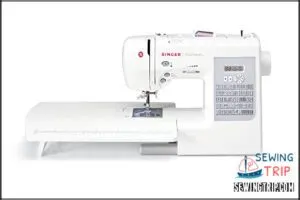
The Singer 7285Q delivers solid performance for quilters who want control without breaking the bank. You get 100 built-in stitches, including 15 dedicated quilting stitches that’ll manage everything from straight-line piecing to decorative borders. The automatic needle threader saves time, though you’ll still need proper thread management skills for consistent results.
Singer built this machine with a metal frame, so it stays stable during long quilting sessions. The programmable needle up/down feature gives you precision at corners—essential for proper quilting techniques. Speed control lets you dial in the right pace for different fabric selections.
Here’s the straight talk: it manages cotton and standard quilting fabrics beautifully, but thick denim or heavy upholstery will slow it down. The drop-in bobbin simplifies bobbin troubleshooting. Regular sewing machine maintenance keeps it running smooth. For the price point, it’s one of the better sewing machine brands for serious hobbyists. The machine’s heavy duty metal frame provides heavy duty support for large projects.
2. SINGER Quantum Stylist 9960 Sewing Machine
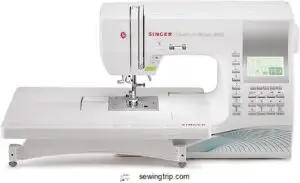
Looking for more power? The SINGER Quantum Stylist 9960 Sewing Machine packs serious capability into a mid-range package. You get 600 builtin stitches, including decorative and quilting options that actually work. The automatic needle threader saves time, and at 850 stitches per minute, your sewing speed keeps projects moving.
Here’s what matters from the repair bench: the automatic threading system holds up better than cheaper sewing machine brands. The thread cutter manages daily use without constant adjustments. Fabric compatibility is strong—it’ll manage denim layers and delicate silks with proper needle selection.
Machine durability checks out. The metal frame provides stability, and Singer backs it with decent warranty coverage. Regular maintenance keeps it running smooth. For the price, it’s a solid workhorse that won’t quit on you mid-project. The Singer Quantum Stylist 9960 is suitable for various sewing machine tasks and provides a wide range of features for sewing and quilting.
3. JUKI TL 2000Qi Sewing Quilting Machine
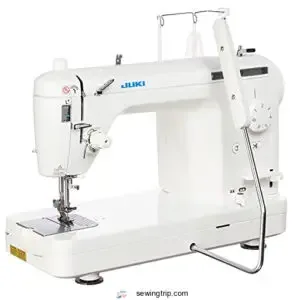
The Juki TL 2000Qi hits differently than computerized machines—it’s built for one thing and does it exceptionally well. This straight-stitch specialist runs at 1,500 stitches per minute with rock-solid sewing accuracy. The aluminum die-cast frame weighs just 15 pounds but stays planted during high-speed quilting.
You get an 8.5-inch throat space that actually matters for larger quilting techniques. The automatic needle threader works reliably, and the LED lighting won’t burn your eyes during long sessions. Thread quality stays consistent because of its horizontal full-rotary hook system.
Machine durability? Five-year warranty backs what I see on the repair bench—these last.
4. Bernette B79 Computerized Sewing Embroidery Machine
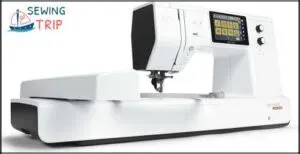
If straight-stitch power isn’t your jam, the Bernette B79 Computerized Sewing Embroidery Machine brings serious versatility. This computerized embroidery machine from Bernina’s sub-brand offers 500 stitches and 208 embroidery designs with a 6.3 x 10.2-inch embroidery area.
Sewing speed hits 900 stitches per minute, and the 5-inch touchscreen user interface makes navigation simple. Machine durability looks solid with proper care, though maintenance costs climb if you ignore regular cleaning.
Among sewing machine brands offering embroidery machines, this one delivers professional embroidery options without the premium price tag.
5. Portable Sewing Machine for Beginners
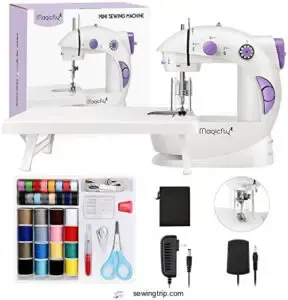
Beginner sewists need a machine that won’t frustrate them. Portable sewing machines built for learning deliver simplicity without sacrificing function. You’ll find these beginner sewing machines pack essential features into designs under 10 pounds.
Here’s what matters in a portable sewing machine for beginners:
- Stitch Options – 8 to 12 built-in stitches cover your basic needs
- Machine Weight – Under 10 pounds for easy storage and transport
- Sewing Speed – Variable speed control lets you master technique slowly
- Thread Types – Compatibility with standard thread and bobbin sizes
- Easy-to-Use Design – Automatic threading eliminates setup headaches
Most beginner sewing machines include accessories like extra bobbins and presser feet to get you started right.
Choosing The Right Sewing Machine Brand for Your Needs
You can’t just pick a brand because it sounds familiar. Your sewing projects, skill level, and budget all matter when you’re choosing the right machine.
Let’s break down what you need to think about before you commit to a brand.
Game Streaming Challenges
You need to weigh reputation, durability, price, features, and support services when choosing your machine. Match the machine’s capabilities to your actual workload and skill level.
Technical hurdles like inadequate processing power or connectivity problems can mirror a sewing machine’s reliability issues—both need solid performance under pressure. Think about latency issues: a delayed response in gaming feels like thread tension problems during stitching.
Consider audience engagement with your projects, not streamer burnout from overcommitment.
Monetizing Streaming Platforms
What’s your actual budget for this investment? Brother’s machines deliver solid performance between $159-$799, proving you don’t need premium pricing for reliable stitching. Their subscriber growth in market share shows smart platform partnerships with retailers.
Singer’s entry-level options start at $99, offering decent warranty coverage despite mixed brand reputation.
Check sewing machine reviews before committing—customer support quality varies dramatically across these sewing machine brands, just like ad revenue models differ between streaming fees and content licensing deals.
Building Streaming Community
Your sewing machine choice shapes your entire crafting journey. Think of brand reputation like community engagement in live streaming—solid customer support and warranty coverage keep you stitching without frustration.
Brother and Janome dominate sewing machine reviews because their chat management equivalents (responsive service teams) actually solve problems. Singer’s mixed feedback mirrors platforms with poor viewer retention.
Check warranty terms closely. That’s your safety net when technical issues hit, just like good social sharing builds lasting connections.
Key Features to Consider When Selecting a Sewing Machine Brand
You can’t just pick a sewing machine based on a flashy ad or a sale price. The brands that hold up in my repair shop share specific traits that separate them from the junk I see break down every week.
Let’s break down the features that actually matter when you’re choosing a brand you can count on.
Reputation and Quality
Industry standards separate the machines that last from the junk that breaks. Brother snagged Good Housekeeping’s top spot in 2025, while Bernina consistently earns high ratings for quality control. You’ll find customer trust matters here—89% of buyers stick with brands they believe in.
Check these factors:
- Warranty coverage spanning 10-25 years for product reliability
- ISO 9001 certification proving manufacturing standards
- Consumer satisfaction scores averaging 4.45 out of 5
- Brand loyalty built through decades of trusted names
- Repair shop recommendations based on real reliability data
Durability
A machine that falls apart after six months isn’t just frustrating—it’s a waste of your hard-earned cash. You want component durability that stands up to real work, not marketing hype. Most quality machines deliver 5-25 years of machine longevity with proper care, while some vintage workhorses push past 50 years.
- Metal frames and gears outlast plastic parts by decades
- Material quality determines your repair costs down the road
- Annual maintenance schedules keep machines running smooth
- High build quality means fewer breakdowns and lower long-term expenses
Price Range
You can’t judge a machine’s worth by its sticker price alone. Entry-level models run $100-$200 and work fine for beginners testing the waters. Mid-range options sit between $300-$600, where you’ll find budget-friendly sewing machines with computerized features that actually hold up. Premium costs start around $800 and climb past $12,000 for Swiss-made powerhouses.
Here’s the reality: brands like Brother and Janome deliver solid budget options under $150, while Bernina won’t even get you in the door for less than $1,000. That price comparison shows you’re paying for metal gears versus plastic parts. Smart cost factors include motor strength, stitch count, and throat space—not just the brand name stamped on top.
Features
After you’ve locked in your budget, the real power comes from knowing which features actually matter. Most modern machines pack 100 built-in stitches or more, but here’s what you should focus on:
- Stitch selection determines your creative range—look for decorative, stretch, and utility options with adjustable width up to 7mm
- Automatic needle threader and one-step buttonholes eliminate the tedious setup work
- Dual-speed functionality with adjustable speed control lets you tackle delicate silks or thick denim without fighting the machine
Smart sewing automation beats flashy stitch counts every time.
Service and Support
Beyond the specs on paper, you need a brand that’s got your back when things break. Brother, Janome, and Singer all offer phone support with email responses in 24 to 48 hours. Warranty coverage varies wildly—Brother covers 25 years on some models, while others cap at two.
Repair costs run $50 to $300 depending on the brand and issue. Check customer reviews and ratings before committing, because a warranty means nothing if repair services don’t exist in your area.
Sewing Machine Brands to Avoid
Not all sewing machines are worth your money. Some brands cut corners with cheap parts and zero customer support, leaving you stuck with a machine that breaks down after a few projects.
Here’s what you need to steer clear of when shopping for your next machine.
Vof
Vof sewing machines aren’t worth the gamble. This Chinese manufacturing outfit makes portable design models that look decent on paper, but the reality tells a different story. Motor failures hit around the $75-$100 repair costs mark, and tension systems fail regularly.
Here’s what you need to know:
- Warranty coverage is practically nonexistent, with delayed or unhelpful responses.
- Customer support won’t return your calls or emails.
- Mechanical issues like skipped stitches and needle breakage are common.
- Replacement parts are impossible to source.
Skip the headache and choose brands with actual service networks.
Jukky (not to Be Confused With Juki)
Don’t confuse Jukky with Juki—they’re worlds apart. Jukky reviews reveal a pattern: thread breaking, skipped stitches, and jammed mechanisms plague these budget sewing machines. About 20-30% of user complaints cite threading failures and durability problems.
While worst sewing machine brands flood marketplaces with low prices, this brand comparison shows Jukky can’t match established sewing machine brands. Machine durability matters when you’re investing your time and money.
Oemer
Oemer reliability falls flat where it counts most. This budget sewing machine brand might tempt you with rock-bottom prices, but you’ll pay later in frustration and repair costs. The facts tell a harsh story—limited market presence means sparse customer support when things go wrong, and with worst sewing machine brands, things always go wrong.
Here’s what you’re risking with Oemer:
- Flimsy plastic components that crack under normal use
- Thread tension failures that ruin your projects mid-stitch
- Warranty coverage that exists mostly on paper
- Motor burnout after minimal hours of operation
- Missing replacement parts when repairs become necessary
Skip these low-quality machines. Your time deserves better than constant troubleshooting sessions.
Toahine
Toahine doesn’t even have an official website or customer support number. That’s your first red flag. When this budget brand shows up on retail sites with bargain prices, you won’t find Toahine reviews from credible sources—just generic machines with zero brand reputation backing them.
The sewing issues start immediately: cheap plastic parts snap under tension, inconsistent stitches ruin your work, and machine durability is nonexistent. These worst sewing machine brands disappear when you need help. Skip the low-quality gamble and choose proven names instead.
Frequently Asked Questions (FAQs)
What is the most reliable brand of sewing machine?
Brother takes the crown for reliability. Their machines run strong with minimal repairs, backed by solid warranty protection and user reviews that prove their reputation.
You’ll get durability and trusted performance without breaking the bank.
Is brother or singer better?
Singer gives you old-school durability and solid stitching for less money. Brother brings modern features and better automation.
For Brand Comparison, choose Singer for reliability or Brother for innovation—both are trusted names in sewing machine brands.
Are Janome and Necchi the same?
Here’s the reality: Janome bought out Necchi back in the 2000s. They’re not the same company historically—Necchi’s Italian, Janome’s Japanese—but today, Janome owns and manufactures everything branded Necchi.
Is a Janome sewing machine better than a brother?
You can’t go wrong with either brand. Janome wins on stitch quality and machine durability, while Brother leads with user interface innovation and sewing speed.
Your budget usually decides which sewing machine brands fit best.
How often should I service my sewing machine?
Service your machine every 12 months or after 100 hours of use—whichever comes first.
Clean the bobbin area after every project and oil moving parts monthly.
Skip this, and you’ll pay for it.
Which brands offer the best warranty coverage?
You’ll get the best warranty protection from Singer and Brother—both offer 25-year coverage on mechanical parts. Janome backs their machines for 15-25 years, while Bernina provides solid 20-year warranty coverage.
Are computerized sewing machines worth the extra cost?
Computerized sewing machines deliver real cost benefits if you need stitch variety and embroidery capabilities. Their sewing speed and precision justify the higher sewing machine price range, though maintenance costs exceed mechanical models over time.
Whats the average lifespan of different brand machines?
Brand comparison shows clear differences in machine longevity. Mechanical Singer and Brother models often last 10-15 years, while Bernina’s durability pushes 20-25 years.
Electronic failure cuts computerized lifespans shorter—proper maintenance helps, but sewing machine durability depends on build quality over reputation.
Can vintage sewing machines outperform modern brands?
You’ll find vintage sewing machines often outlast modern brands in stitch quality and mechanical reliability. Their all-metal construction means decades of use, though maintenance costs and parts availability require more attention than newer computerized models.
Whats the difference between mechanical and computerized machines?
Mechanical sewing machines use manual dials and knobs for basic stitch options.
Computerized embroidery machine models feature digital user interface controls with hundreds of sewing machine features, automated maintenance costs, and precise sewing speeds through electronic sewing machines technology.
Conclusion
Your sewing machine choice will either become your most trusted workshop companion or a $200 paperweight gathering dust in your closet. The best and worst sewing machine brands separate themselves through one brutal truth: metal parts and reliable support outlast marketing hype every time.
Stick with Singer, JUKI, or Bernette if you want machines that actually sew. Avoid the budget knockoffs that crack under pressure. Your projects deserve better than plastic gears and vanishing customer service.
- https://www.mygoldenthimble.com/sewing-machine-brands/
- https://edisonvacuums.com/choosing-a-sewing-machine-most-popular-brands-in-the-u-s/
- https://www.reddit.com/r/sewhelp/comments/19c32hf/whats_a_good_sewing_machine_other_than_singer/
- https://thegnomestudio.com/janome-vs-brother/
- https://www.thesewingstudio.co.uk/blogs/blog/best-sewing-machine-2024

